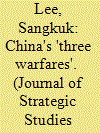|
|
|
Sort Order |
|
|
|
Items / Page
|
|
|
|
|
|
|
| Srl | Item |
| 1 |
ID:
107323


|
|
|
|
|
| Publication |
2011.
|
| Summary/Abstract |
In recent years, a system of "province leading counties" (shengguanxian) is rising in most Chinese provinces. The main features of this administrative reform, which took place during the period 2002-2008, were the expansion of counties' administrative and economic powers and the implementation of a "province leading counties" fiscal system. The depth of this reform, in terms of the number of powers devolved to counties and the type of local fiscal system, varied widely between provinces. This article explores the experiences of the provinces of Zhejiang. Jiangsu, and Jilin and seeks to explain why and how the "province leading counties" policy has become increasingly popular. The article suggests that even though the stated aim of the reform is to promote the economic development of counties, the significant local variation in its implementation is the result of provincial political-economic factors, that is to say, interaction between the provincial leadership, private business, and the varying capabilities of prefecture-level cities and counties. This contrasts with the view of some scholars that variations in the intensity of the reform can be attributed to differing levels of marketization and economic development among provinces.
|
|
|
|
|
|
|
|
|
|
|
|
|
|
|
|
| 2 |
ID:
131338


|
|
|
|
|
| Publication |
2014.
|
| Summary/Abstract |
Entering the twenty-first century, China has demonstrated an assertive foreign policy, not only in employing various types of economic and military leverage but also in conducting the Three Warfares (??) - psychological warfare, public opinion warfare, and legal warfare. This article attempts to identify the motives and methods of China's Three Warfares by analyzing its history, logic, and agents. Based on this analysis, the author also presents the position of the Three Warfares in China's foreign policy and the warfares' impact on the international security environment involving other major powers and China's neighbors.
|
|
|
|
|
|
|
|
|
|
|
|
|
|
|
|
| 3 |
ID:
153390


|
|
|
|
|
| Summary/Abstract |
Xi Jinping swiftly centralized political power shortly after the 18th Chinese Communist Party (CCP) National Congress in 2012, opposing what was predicted when he was elected general secretary. This action also compromises China’s long-term efforts to avert an over-concentration of power among a few elites. This study deals with Xi’s strong ascent to power, defined as the result of institutional change in China’s political power game from the perspective of new institutionalism. The author identifies triggers of institutional change, ideas and norms introduced for changing informal institutions, and the actual transformation of formal institutions, arguing that Xi took advantage of social demand for reform coordination as well as some top elites’ serious political misbehavior to commence institutional change for the centralization of political power. To do so, Xi introduced new reform ideas – systemic thinking and top-down design, originating from complex systems theory – in the name of coordinating and comprehensively deepening reform. Xi eventually succeeded in justifying the centralization of power and the establishment of central organizations to deepen reforms comprehensively and coordinate internal and external security. As a result, Xi seized power while practically nullifying the principle of division of work.
|
|
|
|
|
|
|
|
|
|
|
|
|
|
|
|
|
|
|
|
|